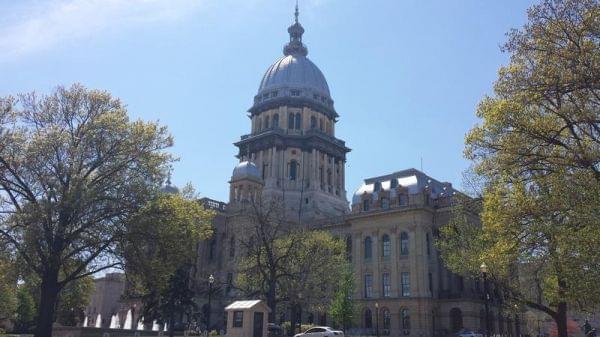Ethics, Endorsements, Et Cetera: What’s Ahead For Veto Session Week Two

The Illinois Statehouse in Springfield. Jenna Dooley/WNIJ
The second and final week of the Illinois legislature’s fall veto session begins Tuesday. State lawmakers will have just three days to get a number of proposals — big and small — over as many legislative hurdles as possible.
For starters, there are plans to ban both public indoor vaping and flavored tobacco products — both of which have drawn backlash from the vaping industry. Then there’s Chicago mayor Lori Lightfoot’s requests on real estate taxes and changing the rules for a city-owned casino. There are even measures like allowing college athletes to profit from endorsements.
Governor J.B. Pritzker admits state lawmakers have a lot to do.
“Three days is not a lot of time to get things done, but I know how hard they [lawmakers] are willing to work, so we’re gonna work together to try to get a lot done in those three days," he told a crowd at an event last week in Will County.
Pritzker says he wants to focus on approving a police and fire pension consolidation plan and lowering insulin prices. The former would bring nearly 650 local pension funds into two separate statewide pools, while the latter aims to limit the price of insulin to just $100.
Meanwhile, the federal investigation of former state Rep. Luis Arroyo and others have led to bipartisan demands that Illinois’ ethics laws be tightened. Arroyo resigned from the state legislature earlier this month, while both state Sens. Tom Cullerton and Martin Sandoval remain in their seats.
While Arroyo would technically be able to help choose his own successor to the Statehouse, House Speaker Michael Madigan wrote to the Democratic committee in charge of that process on Monday, stating it ought to keep the beleaguered former lawmaker out.
Illinois Senate President John Cullerton says that situation and others will make tackling ethics rules a top priority.
“I went back and looked at what we did when Blagojevich was impeached; we had a joint committee with the House and the Senate," he recalled during a reporter's conference last month. "There’s clearly some issues that were not addressed ten years ago with regard to lobbying, which is something we should look at for sure.”
For now, the governor and others have said they support requiring lobbyists to disclose their income. Revelations from federal investigations have shown statehouse lobbyists were involved in a number of alleged wrongdoings.
It’s expected state lawmakers will also debate whether there should be restrictions on smoking marijuana in public, along with other minor moves to "clean up" parts of Illinois' cannabis legalization measure that may be ambiguous.
